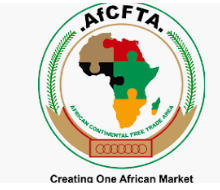As part of your qualifications you will have already learnt or will learn about the importance of the key rules of world trade, covering key principles such as Origin of Goods, Valuation, HS Codes and Safety and Security.
As we know these principles practically impact how countries and their businesses operate.
In the world today we now have the opportunity to see how these principles will be applied in the trade discussions between the UK and the European Union. We can also review the emerging African Continental Free Trade Area (AfCFTA) as an example of how rules are applied at a regional level.
AfCFTA has the potential to rival other world trade blocs, covering a market of 1.2 billion people and a gross domestic product (GDP) of $2.5 trillion, across all 55 member States of the African Union. Estimates from the Economic Commission for Africa (UNECA) indicate that AfCFTA has the potential to boost intra-African trade by 52.3% by removing import duties and reducing non-tariff barriers.
The Agreement Establishing AfCFTA entered into force on 30 May 2019 for the 24 countries that ratified the agreement. To date 30 countries have both signed and approved ratification of AfCFTA. From the 55 African Union member states, only Eritrea has yet to sign.
AfCFTA is now in the operational phase in which many of the key rules of the trading bloc have to be agreed.
Below are some examples of the key principles we mentioned in action in this phase of AfCTA:
| Rules of Origin | The conditions under which goods and services can be traded tariff freely in the trade area |
| Agreement on Tariffs | The tariff concessions that will apply. A 90% tariff liberalisation has been agreed, to be introduced on the 1st July 2020 |
| Monitoring of Non-Tariff Barriers (NTB’s) | An online mechanism for monitoring, reporting and elimination of NTBs |
| Pan-African Payment System | To facilitate payments on time and in full; payments in local currency with net settlements of foreign exchange |
| African Trade Observatory | Trade information portal, covering opportunities and trade statistics and data |
Trading under the AfCFTA Agreement was due to commence on 1 July 2020, but following the COVID-19 global pandemic, this date is being postponed, with a new date to be confirmed by the African Union Commission.
A further and interesting consideration is how the AfCFTA relates to existing trade arrangements in place, for example with the European Union, and going forward with the United Kingdom.
- Will the African Union prefer a continent-to-continent trading arrangement, or will they allow bilateral Economic Partnership Agreements which the European Union has sought to agree under the African, Caribbean and Pacific (ACP) framework (for which all African states belong except Algeria, Egypt, Libya, Morocco, Tunisia and South Africa many of which have separate trade agreements with the EU)?
Written by Kevin Shakespeare, Director of Stakeholder Engagement at the Institute of Export and International Trade.

